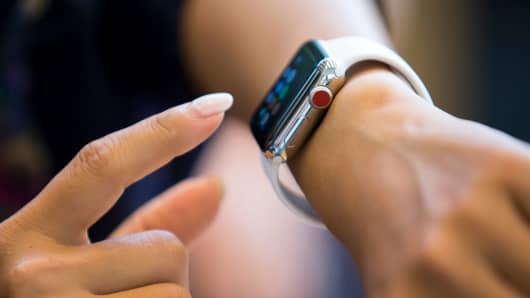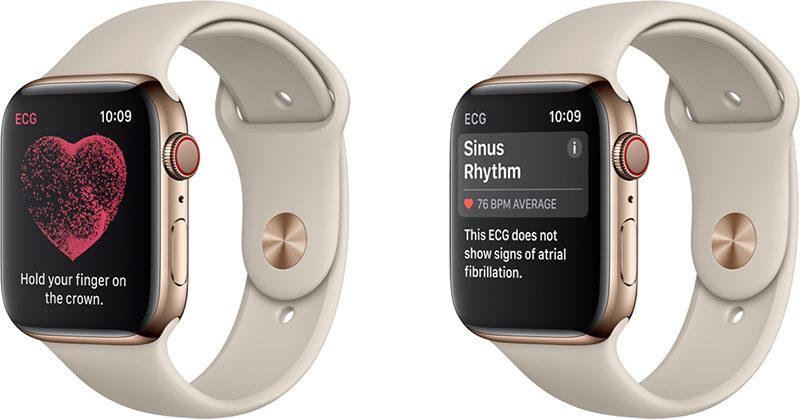Technology Advancing Us Toward Hypochondria
"The fear is we could end up with a lot of over-treatment, over-call and people waiting in emergency departments for no good reason."
"[Heart rate variations throughout the day are normal] and now we're going to pick up much more of that signal."
"[A single-lead ECG connection can't diagnose a heart attack] so that's important to get across."
Dr. Samuel Vaillancourt, St.Michael's Hospital, Toronto
"The danger with any new medical technology is that in the enthusiasm to be an early adapter, for what is an admittedly cool gadget, we risk engaging in a population-wide screening strategy that is decidedly flawed."
"[Guidelines don't recommend screening people for AF -- atrial fibrillation], so in a sense no one needs to wear this on the wrist."
"Since the people who are more likely to buy an Apple Watch are younger and probably therefore healthier [wearing an ECG on their wrist] 24/7 is likely going to create a lot of false positives."
"The main risk of AF is that it increases the risk of stroke."
Dr. Christopher Labos, Montreal cardiologist, associate, McGill Office of Science and Society
 |
Tomohiro Ohsumi | Getty Images
A person uses an Apple Watch Series 3 at the Apple Omotesando store on September 22, 2017 in Tokyo, Japan |
"This is going to create such a massive headache [for doctors]."The people most likely to be or become candidates for atrial fibrillation are the elderly. How comfortable are those in that age category with the use of technologically advanced gadgets that send their younger contemporaries into paroxysms of desire to own the latest, hottest, coolest gadgets on the market? Those already suffering from compromised health conditions and whom readouts of their heart rhythm at any given time presented to their cardiologists for whom the Apple Watch with its over-the-counter ECG could be useful wouldn't be using it; too complex, too confusing.
"Every worried [healthy] Tom, Dick and Harry are (sic) going to be freaking out about every blip thing that shows up on their Apple Watch."
Dr. Ethan Weiss, associate professor, University of California, San Francisco
"Often patients come to us saying that they feel stuff, but we don't have the rhythm recorded so we can't really tell what's going on."
"I think it behooves us as a medical profession to educate the public that, if you have Afib, it's not the end of the world. [Different if other risk factors for stroke are present, or if long periods of irregular rhythm arise] like days and days, and the heart is really fast."
"[Should the app pick up an abnormality, that should be shared with a doctor for further testing] to figure out if it's atrial fibrillation, or if it's nothing."
Dr. Andrew Ha, cardiac electrophysiologist, Peter Munk Cardiac Centre, University Health Network, Toronto
AF is a leading cause of stroke, affecting approximately 34 million people worldwide. Apple's ECG app is not endorsed by the American Heart Association, but it does admit the device could possibly lead to swifter diagnoses of AF. The recordings, stored in a health app, can generate a PDF to be delivered to the wearer's doctor for consultation, in the best of all possible scenarios. However, given the demographic that will be wearing the watch, it isn't too likely that this scenario will emerge from a gadget that impresses with its capability but in reality is just another plaything.
According to the Apple Watch specifications, the ECG app detects signs of an erratic heart rhythm. But under many circumstances, some normal, some adverse, heart rhythm fluctuates during the space of a day. Separating the wheat from the chaff as it were, is a diagnostician's professional aptitude and concern, not the wearer of the watch who has no medical experience and would be prone to imagining worst-case scenarios unfolding.
So even though the app, according to Apple's description of its function, generates a "heart rhythm classification" with the potential of determining whether heart is beating normally, or whether signs of atrial fibrillation have been detected, what is the wearer going to do with that information aside from panicking? AF causes the heart to quiver and possibly beat chaotically rather than contract in a measured way with each heartbeat. The risk of AF is blood pooling in the heart's upper chamber, where clots can form and move through arteries feeding the brain, to cause a stroke.
A normal ECG has a dozen 'leads' placed on the chest for detection of symptoms, while the Apple ECG app has a single lead. What emerges from that single lead can be very misleading and certainly incomplete. Research studies on systematic screening of large populations for the presence of AF has not proven to be useful, according to Montreal cardiologist Labos, in an article published by McGill University's Office for Science and Society.
False positives are the major concern; false positives where a test indicates abnormality when in fact the results of the test fail to reveal anything abnormal at all, have been common occurrences among the healthier contingent of people tested. Should an individual be tested and found to have AF, the presence of additional risk factors like high blood pressure, diabetes or old age would indicate the use of blood thinners. But not everyone diagnosed with AF requires blood thinners.
And according to Dr. Ha, though the Apple app could provide health professionals with a measure of objective proof of an abnormal heart rhythm, that single lead test should never be considered a substitute for a standard, infinitely more accurate ECG interpreted by an expert. Bearing in mind at the same time that some people with AF have no symptoms whatever, while others are unable to function, continually exhausted.
Clearly, diagnosing such conditions can be complicated requiring medical devices more complex than the Apple app, and the experience leading to related treatment of a specialist. Piggy-backing a medical device onto a technological gadget speaks to the technology-fascinated aficionado's appetite to acquire the latest offering in technological advances and in this instance of health-monitoring and diagnosis, Apple has entered a realm where confusion and complication rule.
It should carry the caution of caveat emptor.

Labels: Cardiac Conditions, Health, Medical Technology, Research


0 Comments:
Post a Comment
<< Home